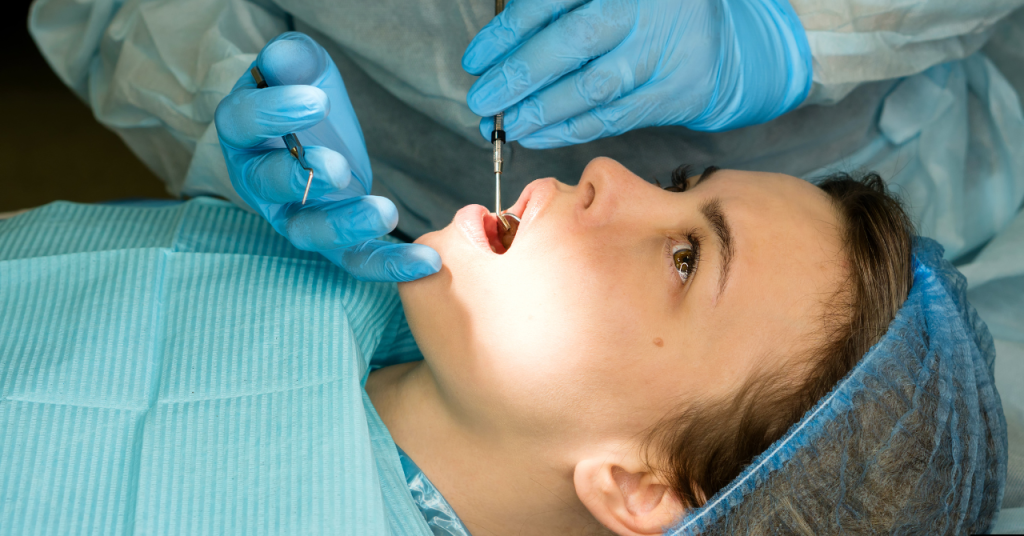
Wisdom teeth, those mysterious third molars, can erupt smoothly or wreak havoc on your pearly whites. When they cause trouble, removal becomes necessary. But how long does this wisdom teeth removal take? Let’s delve into the timeline, from pre-surgery prep to post-operative recovery.
Pre-Surgery Preparation: Setting the Stage (1-2 weeks)
Before the big day, you’ll embark on a pre-surgical journey. Here’s what to expect:
- Consultation: This initial meeting with your dentist or oral surgeon is crucial. X-rays will be taken to assess wisdom tooth positioning and root development. They’ll discuss anesthesia options (local, sedation, or general) and answer any questions you might have. Be sure to mention any medical conditions or medications you’re taking.
- Medical Clearance: If you have pre-existing health concerns, your dentist may require clearance from your primary physician to ensure surgery safety.
- Antibiotics: In some cases, your dentist might prescribe antibiotics before surgery to minimize infection risk.
The Wisdom Teeth Removal Procedure: Unveiling the Hour (45 minutes to 2 hours)

The day arrives, and it’s time to say goodbye to those troublesome wisdom teeth. Here’s a breakdown of the procedure itself:
- Arrival and Anesthesia: You’ll arrive at the dentist’s office or surgical center. An IV might be placed for sedation or general anesthesia. With local anesthesia, only the area around the wisdom teeth will be numbed.
- The Extraction: The dentist or surgeon will make an incision in the gum tissue to access the wisdom tooth. Depending on the tooth’s position and complexity, they might section it into smaller pieces for easier removal. Stitches might be used to close the incision after extraction.
The Total Time: The actual removal process typically takes 45 minutes to 2 hours, depending on several factors:
- Number of Teeth: Removing four wisdom teeth will naturally take longer than removing two.
- Tooth Complexity: Impacted wisdom teeth (stuck below the gum line or bone) require more surgical intervention, extending the procedure time.
- Anesthesia Type: General anesthesia often takes longer as the patient needs to be fully asleep before surgery begins.
Post-Operative Recovery: The Healing Journey (1-2 weeks)
After the procedure, you’ll be monitored in a recovery area until the anesthesia wears off. Here’s what to expect during the healing process, which typically takes 1-2 weeks:
- The First 24 Hours: Expect swelling, discomfort, and some bleeding. Apply ice packs to your face to reduce swelling and take prescribed pain medication.
- Days 2-3: Swelling should start to subside. Continue pain medication and maintain a soft food diet.
- Days 7-10: Significant improvement should be noticeable. Stitches might be removed during this time.
- Weeks 2-4: Most discomfort should be gone, and you can gradually return to your regular diet.
Factors Affecting Recovery Time:
While the general timeframe is 1-2 weeks, several factors can influence your recovery:
- Surgical Complexity: Impacted or complex extractions often lead to a longer healing time.
- Individual Healing Rate: Everyone heals at their own pace. Be patient and listen to your body.
- Post-Operative Care: Following your dentist’s instructions regarding rest, medications, and dietary restrictions is crucial for a smooth recovery.
Beyond the Basics: Additional Tips for a Smooth Recovery
Here are some bonus tips to optimize your wisdom teeth removal recovery:
- Stock Up on Soft Foods: Stock your pantry with soft foods like mashed potatoes, yogurt, and applesauce.
- Rest: Prioritize rest to allow your body to heal.
- Oral Hygiene: Gently clean your mouth with a saltwater rinse after 24 hours to promote healing and prevent infection.
- Pain Management: Take prescribed pain medication as directed by your dentist.
- Limit Activity: Avoid strenuous exercise and heavy lifting for the first few days.
Read More Articles- Top 30 Recipes for Wisdom Teeth Removal
When to Call Your Dentist:

While some discomfort is expected after wisdom teeth removal, certain signs warrant contacting your dentist:
- Excessive bleeding or swelling
- Fever or chills
- Persistent pain not relieved by medication
- Difficulty swallowing
The Takeaway: Wisdom Teeth Removal – A Temporary Hiccup
Wisdom teeth removal might seem daunting, but the procedure itself is relatively quick, and the recovery timeline is manageable. By following your dentist’s instructions and practicing good post-operative care, you’ll be back to flashing your pearly whites in no time. Remember, communication is key. Discuss any concerns you have with your dentist or oral surgeon before, during, and after the procedure. With proper planning and care, wisdom teeth removal can be a smooth journey.
Beyond the Physical: The Emotional Side of Wisdom Teeth Removal
Wisdom teeth removal, while a common procedure, can evoke anxiety in some patients. It’s perfectly normal to feel nervous or apprehensive. Here are some tips to manage those emotions:
- Talk to Your Dentist: Discuss your anxieties with your dentist. They can address your concerns and explain the procedure in detail, putting your mind at ease.
- Relaxation Techniques: Practice relaxation techniques like deep breathing or meditation before and after surgery to manage anxiety.
- Support System: Having a trusted friend or family member by your side during the pre-and post-operative process can be incredibly comforting.
Financial Considerations: Planning for Wisdom Teeth Removal
The cost of wisdom teeth removal can vary depending on factors like location, anesthesia type, and surgical complexity. Dental insurance typically covers a portion of the cost. Here are some tips for managing the financial aspect:
- Talk to Your Insurance Provider: Understand your dental insurance coverage beforehand.
- Payment Options: Many dental offices offer financing options to help spread out the cost.
- Consider the Long-Term: While the upfront cost might seem high, remember that removing problematic wisdom teeth can prevent future complications and save money in the long run.
Wisdom Teeth Removal: A Rite of Passage?
Wisdom teeth removal, though not always necessary, is a common experience for many young adults. By understanding the timeline, potential challenges, and recovery process, you can approach this procedure with confidence. Remember, knowledge is power. With the right information and preparation, you can navigate wisdom teeth removal with ease and get back to enjoying a healthy, pain-free smile.
Wisdom teeth removal is a temporary setback on the road to a lifetime of good oral health. By planning, following your dentist’s instructions, and taking care of yourself during recovery, you can ensure a smooth and successful experience. So, don’t let wisdom teeth hold you back. Embrace the knowledge you’ve gained, and get ready to conquer this common dental procedure!